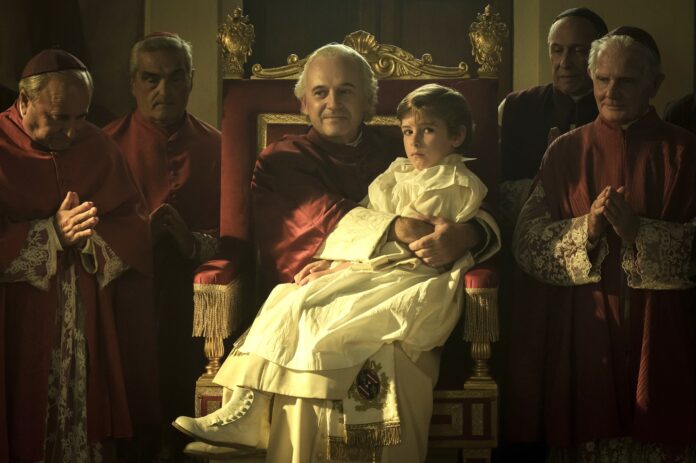Past, present and future are fully represented in three new releases hitting theaters this weekend. All are worth a look, though you guessed it: Humanity doesn’t come off particularly well in any of the designated time zones.
Last man standing from Italy’s remarkable new-talent pool of the 1960s (though The Night Porter’s Liliana Cavani still flies the flag for its few women), Marco Bellocchio remains in full command of his skillset at age 84. His new Kidnapped, opening Fri/31 at SF’s Opera Plaza and the Smith Rafael Film Center, is a handsomely mounted costume drama based on historical fact. In 1852 Bologna, the prosperous Mortara family employ a Christian maid (Aurora Camatti) so simple that when the sixth of their nine children falls ill, she secretly baptizes him—believing that the clan’s Jewish persuasion would otherwise condemn him to eternal Hellfire in death.
Years later, after the maid has been fired for stealing, that secret reaches the ears of the Catholic Church. Despite press condemnation over such “kidnappings” (and the Vatican’s serious indebtedness towards Jewish banker Rothschild), the boy Edgardo (Leonardo Maltese) is seized by authorities and spirited off to a series of religious institutions.
The justification is that having been baptized, he is a Christian, even without his own knowledge or his parents’ consent—making it legal for him to be torn from his own kin. Needless to say, this situation is excruciating for those parents (Fausto Russo Alesi, Barbara Ronchi), and politically awkward for the Pope (Paolo Pierobon)…even if the latter is blatant anti-Semite who has lurid nightmares of Jews breaking into his bedchamber to circumcise him.
It’s a grotesque story in which the shock of institutionalized bigotry is cushioned by the smug complacency of church officials, and their entwinement with a politely disapproving but obedient secular society. Sprawling over years that eventually weaken Vatican power, bringing civil war to boot, Kidnapped is an indictment marked by its director’s usual mixture of high polish, ironic wit and shock value. If it’s more impressive than emotionally involving, that suits Bellocchio’s approach—he’s less interested in the fate of poor Edgardo (bizarre as that turns out to be) than in his status as a cog in the gears of a corrupt religious apparatus that in some respects has scarcely changed since the Inquisition.
If that true story is one of methodical, bloodless, primarily psychological hostility, the fictive In a Violent Nature (opening at various Bay Area theaters including the Alamo Drafthouse on Fri/24) is its opposite—all about impulsive, grave physical harm. The present tense Chris Nash’s first directorial feature takes place in is the familiar one of horror movies throughout the last forty years or so. It’s the creepy forested parklands of Friday the 13th, The Blair Witch Project, et al., in which hapless young campers find their numbers gruesomely winnowed by a seemingly unstoppable assailant who may be some sort of deathless supernatural force.
In this case, he/it is the erstwhile perp-protagonist of the folkloric “White Pine Massacre,” his spirit reawakened when a couple hikers disturb a gravesite in the ruins of a fire watchtower. Needless to say, those mortals don’t stay alive very long, and the ghoul they’ve roused is soon stalking any and every other human in the vicinity. His deeds get gorier with each new kill.
What distinguishes this Canadian indie from umpteen prior such exercises is the purity of its gimmick: Where most slasher flicks tease us with the occasion hand-held “killer’s viewpoint” shot, Nature is entirely from the Unstoppable Killing Machine’s POV. That lends the victims’ personalities and narrative arcs an intriguing puzzle-piece gist—we see/hear them so sporadically, we get just a very partial grasp on their experience—and the whole an atmospheric eeriness heightened by the lack of any background music. This isn’t the scariest movie, but it manages to make familiar genre territory feel fresh again.
Looking to the future in a subtle, poetical way is Margreth Olin’s documentary Songs of Earth, which opens at the Rafael Center this Fri/31, then at the Roxie Theater next week, June 7. She interviews her elderly parents, who are inevitably facing mortality—mother Magnhild a bit tearfully, father Jorgan more stoically. At 84, he still hikes all around the rural Western Norway area where he’s lived his whole life, and indeed his family has dwelt for generations. (The nearby farm he grew up on dates back at least to 1600.) He is much attuned to nature, as is the film, which was shot over four seasons.
Executive produced by Liv Ullmann and Wim Wenders, these 90 minutes are a sight for sore eyes, a visual beauty bath—stupendous landscapes in snow and spring bloom, plus northern lights, waterfalls, et al., often captured in drone shots by cinematographer Lars Erlend Tubaas Oymo. The sense of awe they instill gains an edge when Jorgan relates anecdotes from his ancestors’ much harder lives, notably those who died in a flood ninety years ago. Their names are recited during a long passage of underwater photography, the places they lived and died now sunk under a few feet of crystalline water.
The scenery conveys a degree of timelessness in which mankind is perhaps a comparatively fleeting presence. But the frequent sound of cracking ice, and snowpacks groaning towards avalanche, remind that this, too, may pass, and sooner than later. While the subject isn’t broached head-on, Songs of Earth is nonetheless haunted by the specter of climate change, which its Nordic vistas feel particularly vulnerable to. Like Olin’s parents, this pristine stretch of Earth itself seems to be approaching an expiration date no one can be wholly prepared for. Intoxicatingly beautiful as it is, the film has an air of lamentation—it’s grieving imminent losses.







